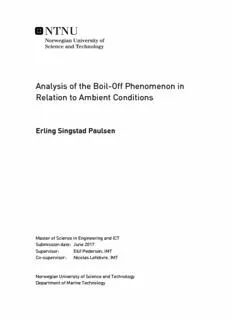
Analysis of the Boil-Off Phenomenon in Relation to Ambient Conditions PDF
Preview Analysis of the Boil-Off Phenomenon in Relation to Ambient Conditions
Analysis of the Boil-Off Phenomenon in Relation to Ambient Conditions Erling Singstad Paulsen Master of Science in Engineering and ICT Submission date: June 2017 Supervisor: Eilif Pedersen, IMT Co-supervisor: Nicolas Lefebvre, IMT Norwegian University of Science and Technology Department of Marine Technology Preface TheworkdescribedinthisMaster’sthesisispartofthestudyprogramEngineeringandICT withaspecializationwithinMarineCyberneticsatNTNU.Thethesisiscarriedoutthespring semesterof2017.WithabackgroundinbothICTandmarinetechnology,Iwantedtoexplore theuseofstatisticallearningmethodsfordataanalysisusingreal-worlddatafromthemar- itimeindustry. Thethesisisacontinuationofpreviousworkcarriedoutthefallsemesterof 2016. ThethesisiswrittenforNTNUincooperationwithDNVGL,whoinitiallyprovidedthedata togetherwithrelevantbackgroundinformationandinterestingproblemstoexplore. Thereaderisassumedtohavebasicknowledgeofmarinevessels,linearalgebra,andstatis- ticalanalysis. i ii Acknowledgments IwouldliketothanktheemployeesatDNVGLwhoprovidedthesensorydataandassisted me throughout the project by providing necessary documentation. I would especially like to thank Christos Chryssakis for providing valuable resources and for continuously being involvedintheprocessthroughSkypemeetings. It has been a great pleasure to have Nicolas Lefebvre as my co-supervisor. He supported methroughweeklymeetingstodiscusstheworkdoneandtohowtobestproceed. Iwould alsoliketothankEilifPedersenforbeingmymainsupervisor. Finally,Iwouldliketothank Christian de Jonge, who has been working with the same data, for our collaboration and numerousdiscussionsthroughoutthesemester. Trondheim,June2017 ErlingSingstadPaulsen iii iv Summary and Conclusions Therelationshipbetweenambientconditionsandtheboil-offofliquefiednaturalgasduring marine transportation has been investigated using a data-driven approach. The data con- sisted of sensory data collected from a vessel over a three year period coupled with global measurementsofambientconditionssuchastemperatureandwaveheight.Statisticalmod- elsweretrainedtopredictthechangeincargolevelfromambientconditions,asthechange incargolevelisadirecteffectofboil-off. Themodelswerethenanalyzedtoassesstherela- tiveimportanceofthedifferentambientconditions. Therelevantdatawereextractedandputonasuitableformat. Thepreprocessingconsisted ofoutlierremoval,noisereductionandsynchronizationofthedata. Fivedatasetswerecon- structed;oneforeachofthefourcargotanksandoneforthecargolevelscombined. Prepro- cessingofthecargolevelsreducedtheamountofdatabyabout95%. Acrudepolynomialmodelwasusedtosimulateavirtualcargolevelasafunctionofthereal ambient conditions. The simulated data were inspected using statistical learning methods to verify that the employed methodology would uncover the relationships in the data. The modelslearnedfromthedatashowedstrongsimilaritieswiththetruemodelandimproved thepredictionerrorrateby87.29%. Bothlinearandnonlinearmodelsweretrained. The same methodology was employed on the real-world data. The best linear and nonlin- earmodelreducedthepredictionerrorrateby45.20%and68.45%respectively. Theresults verifiedthatambientconditionscanbeusedtopredictboil-off, althoughitisunlikely that truerelationshipislinearinnature. Theparametersensitivityofthebestlinearmodelswas analyzed to assess the importance of the different ambient conditions. The results consis- tently ranked the ambient temperature and waves as most important, as expected due to heatleakageandsloshinginthetanks. Fromthebestlinearmodel,thechangeincargolevel wasfoundtobevaryinglinearlywithambienttemperature, asshownintheliterature, and nonlinearlywithwavesandwind. v vi
Description: